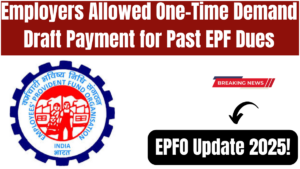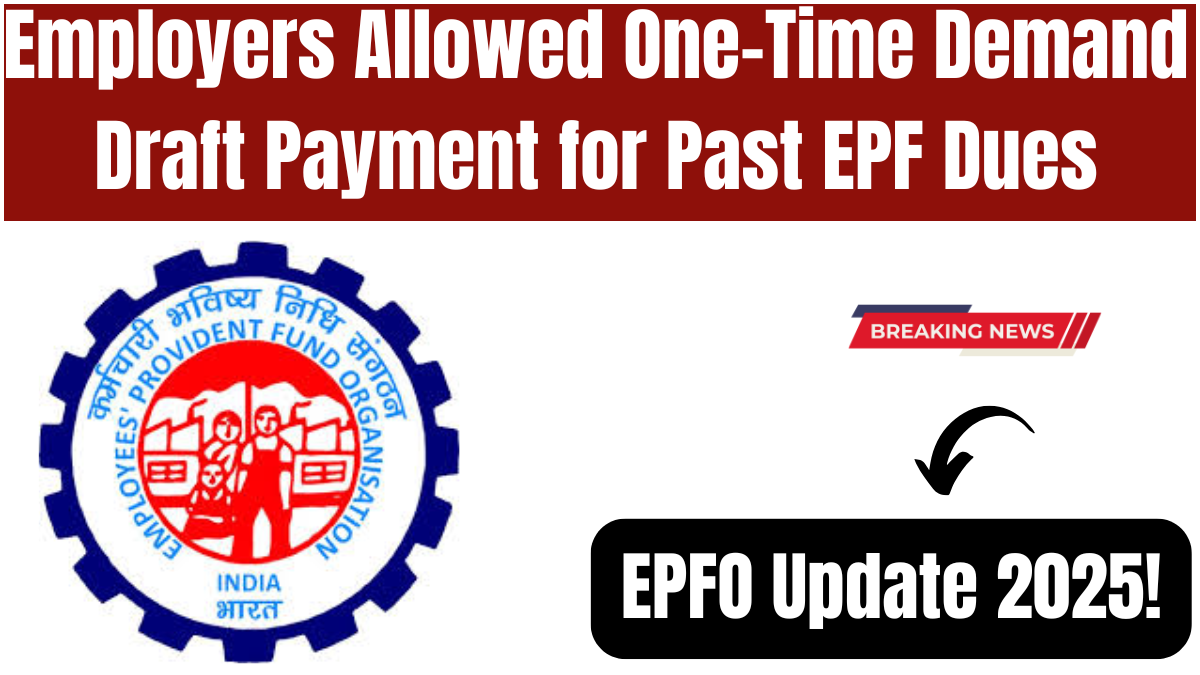The Employees’ Provident Fund Organisation (EPFO) has introduced a new relief option for employers, allowing them to clear their pending EPF dues through a one-time demand draft payment. This move departs from the traditional Electronic Challan-cum-Return (ECR) and internet banking process and comes as a response to ongoing technical issues that many employers have been facing.
Many employers reported recurring problems in the online ECR system that led to payment delays, penalties, and dissatisfaction among employees. Recognizing these concerns, EPFO has now decided to accept offline payments in exceptional cases to ensure that employers can meet their obligations without being unfairly penalized.

Why This New Payment Method Was Introduced
The ECR system has posed technical difficulties for several employers, often causing delays in EPF contributions and incurring penalties. Regional field offices brought these issues to EPFO’s attention, urging them to provide alternative ways for clearing dues. EPFO has acknowledged that it should not refuse payments simply because of ECR submission problems. The relief is, however, limited to a single-time settlement of past dues.
Verification and Approval Conditions
Before an employer can proceed with the demand draft payment, the request must be verified by the Officer-in-Charge of the respective EPFO regional office. The officer must confirm that the payment is a one-time case and that the employer will continue using the ECR system for future dues. Once verified, the payment will be directed to the Regional Provident Fund Commissioner (RPFC) through the designated bank.
Requirements for Employers
Employers opting for this offline payment method must follow certain steps to ensure transparency:
-
Submit a written undertaking affirming the payment is a one-time case
-
Provide a detailed list of affected employees
-
Continue to file their returns with the payment to maintain accurate employee records
The EPFO has emphasized that this relief measure should not be seen as a permanent shift away from digital systems. Employers are still encouraged to use ECR and internet banking for all current and upcoming payments.
EPFO’s Digital Push Still in Focus
Despite this temporary offline option, EPFO continues to promote the use of digital platforms for efficient compliance and transparency. The ECR process remains the primary tool for routine EPF filings, and the demand draft payment is only allowed in rare cases where technical issues prevent timely online contributions.
Benefits of the One-Time Demand Draft Option
This decision provides much-needed breathing space for employers caught in procedural or technical challenges. It acknowledges the importance of flexibility while reinforcing the EPFO’s commitment to digital transformation. Employers who have genuine difficulties in submitting past dues online can now make amends without being burdened by additional penalties.
FAQs
Who is eligible to use the demand draft method for EPF dues?
Employers who are unable to clear past EPF dues due to technical issues in the ECR system are eligible for this one-time payment option.
Can this method be used for future EPF payments?
No, this is strictly a one-time provision for past dues. Future EPF contributions must continue through the ECR and internet banking process.
What documents are required for the demand draft payment?
Employers need to submit a formal undertaking and a list of affected employees along with the demand draft.
How is the payment verified and processed?
The Officer-in-Charge will review the request to ensure it’s a one-time payment and then approve it for processing through the RPFC.
Do employers still need to file ECR returns?
Yes, even when paying via demand draft, employers must submit their ECR returns to keep employee records accurate and updated.
Click here to know more.
Aanchal is a passionate writer with a keen interest in storytelling, content creation, and creative expression. She enjoys exploring diverse topics and crafting engaging narratives that captivate readers.

